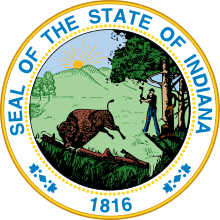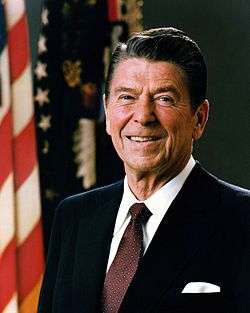Otis Bowen
| Otis Bowen | |
|---|---|
 | |
| 16th United States Secretary of Health and Human Services | |
|
In office December 13, 1985 – January 20, 1989 | |
| President | Ronald Reagan |
| Preceded by | Margaret Heckler |
| Succeeded by | Louis Sullivan |
| 44th Governor of Indiana | |
|
In office January 8, 1973 – January 12, 1981 | |
| Lieutenant | Robert Orr |
| Preceded by | Edgar Whitcomb |
| Succeeded by | Robert Orr |
| Chair of the National Governors Association | |
|
In office July 10, 1979 – August 5, 1980 | |
| Preceded by | Julian Carroll |
| Succeeded by | George Busbee |
| Speaker of the Indiana House of Representatives | |
|
In office November 9, 1966 – November 8, 1972 | |
| Preceded by | Richard Clay Bodine[1] |
| Succeeded by | Kermit Owen Burrous |
| Member of the Indiana House of Representatives from the 8th district | |
|
In office November 9, 1960 – November 8, 1972 | |
| Preceded by | Forest Nelson McLaughlin |
| Succeeded by | James Lowell Drews |
| Member of the Indiana House of Representatives from Marshall County | |
|
In office November 7, 1956 – November 5, 1958 | |
| Preceded by | Raymonde Alexis Clarke[2] |
| Succeeded by | Forest Nelson McLaughlin |
| Personal details | |
| Born |
Otis Ray Bowen February 26, 1918 Fulton County, Indiana, U.S. |
| Died |
May 4, 2013 (aged 95) Donaldson, Indiana, U.S. |
| Political party | Republican |
| Spouse(s) |
Elizabeth Steinmann (1939–1981) Rose Hochstetler (1981–1991) Carol Hahn (1992–2013) |
| Children | 4 |
| Education |
Indiana University, Bloomington (BA) Indiana University, Indianapolis (MD) |
| Military service | |
| Allegiance |
|
| Service/branch |
|
| Years of service | 1943–1946 |
| Battles/wars | World War II |
Otis Ray Bowen (February 26, 1918 – May 4, 2013) was an American politician and physician who served as the 44th Governor of Indiana from 1973 to 1981 and as Secretary of Health and Human Services from 1985 to 1989.
Early life
Bowen was born near Rochester, Indiana, to Vernie Bowen and Pearl Irene Wright. His father's side of the family was deeply religious and originally came from Ohio. Vernie graduated from Valparaiso University and was a teacher for 43 years. Vernie also owned a hardware store in Leiters Ford, was a trustee for Aubbeenaubbee Township, President of the Woodlawn Hospital Board of Trustees, and President of the Leiters Ford Merchants Association. His father was a Scottish Rite Freemason and a member of the Independent Order of Odd Fellows. In 1915, Vernie married Pearl Irene Wright, whose family was also from Ohio and involved with the Independent Order of Odd Fellows. Otis Bowen is a distant relative of George H. W. Bush through two brothers who immigrated to New England from Somerset, England.
Dr. Bowen received his elementary and high school education from local schools and went on to graduate from Indiana University Bloomington with an A.B. in 1939 and the Indiana University School of Medicine with an M.D. in 1942. At IU, he became a member of the Delta Chi Fraternity as well as the Phi Beta Pi Medical Fraternity.[3] He holds 30 honorary degrees including those from schools in his home state such as Indiana University, the University of Notre Dame, Ball State University, Valparaiso University, and Anderson University. In addition to an honorary degree, Bethel College also named their campus library in his honor.
He married Elizabeth Anne Steinmann in 1939, who died shortly before his term as Indiana Governor expired in 1981. They had four children; Rick, Judy, Tim, and Rob. Following her death, he married Rose May Hochstetler in September 1981. In 1991, Rose died. In 1992, he married Carol Hahn, a marriage that lasted until his death.
Career
(Gerald_Ford_Library)_(cropped).jpg)
.jpg)
Bowen began his career on an internship from Memorial Hospital in South Bend, Indiana, in 1942. From 1943 to 1946 he served in the Medical Corps of the United States Army, rising from the rank of 1st lieutenant to captain. On his return from World War II, he set up his own medical practice in his home town of Bremen, Indiana, which he discontinued in 1972. During this time, he also was a member of staff for various hospitals in Indiana and served as coroner for Marshall County, Indiana. In 1981 he took up the post of clinical professor of family medicine at Indiana University.
During his medical and teaching career, Bowen also got into Republican Party politics, serving as a member of the Indiana House of Representatives from 1956 to 1958 and again from 1960 to 1972. He was speaker of the house from 1967 to 1972, Vice Chairman of the legislative council from 1967 to 1968, and Chairman until 1972. After his unsuccessful attempt in 1968, he was elected Governor of Indiana in 1972 and was re-elected for a second term in 1976, making him the first Governor to serve for eight consecutive years in Indiana since 1851. His campaign slogan, featured in huge letters on billboards, was "Otis Bowen. He Hears You". As Governor he initiated a tax restructuring, and developed a statewide emergency medical services system. From 1978 to 1985, he also served on the board of trustees for Valparaiso University. Simultaneously, Bowen served as chairman of the Republican Governors Association, and the Midwestern Governors Association, and the National Governors Association. In 1980, he served as President of the Council of State Governments.
Bowen continued teaching at Indiana University until he was appointed by President Reagan as Secretary of Health and Human Services and confirmed by the US Senate on a vote of 93 to 2, making him the first medical doctor to serve in this position.
At the time of his appointment, criticism was rising that the Reagan Administration was not doing enough to respond to AIDS. Although not as prominent in his advocacy for AIDS issues as then-Surgeon General C. Everett Koop, Bowen did offer explicit warnings about the threats posed by the disease, including its risk to heterosexuals. By 1987, he warned that the threat posed by AIDS could rival deadly health disasters like the Black Death, smallpox, and typhoid if more was not done to combat the threat posed by the disease. The following year, after new studies were released showing that the spread of the disease was slowing within many population groups, he commented that "We do not expect any explosion into the heterosexual population."[4]
It is said that as Secretary he always had a prescription pad handy, recommending remedies to treat minor ailments for both colleagues and members of the press. He served this position until 1989, when he retired to his home in Bremen, Indiana.
Community involvement

Bowen served on a number of committees and conferences, including the Education Commission of the States, and the President's Commission on Federalism. He was the chairman of the Paperwork Commission, Nursing Study Commission, and Medicare Study Commission. He has also received various awards, including the George F. Hixson award from Kiwanis International. Bowen is a Lutheran and member of the American Medical Association, the American Legion, Veterans of Foreign Wars, Alpha Omega Alpha, Phi Beta Pi, Delta Chi, and Kiwanis.
The Bowen Center for Public Affairs was founded by Ball State University in honor of Bowen. He attended every year and provided a congratulatory address to the graduates of this two-day seminar.
The Otis R. Bowen Museum, located on the campus of Bethel College, houses memorabilia and artifacts related to Dr. Otis Bowen's years as Governor of Indiana and Secretary of Health and Human Services. It also houses a copy of the Otis Bowen (bust).
Death
Bowen died May 4, 2013, at a nursing home in Donaldson, Indiana. He was 95.[5]
See also
References
- ↑ http://www.capitolandwashington.com/offices/all-offices/1000/
- ↑ http://www.capitolandwashington.com/offices/all-offices/h50/
- ↑ Arbutus Yearbook. Bloomington, Indiana: Indiana University. 1941. p. 122.
- ↑ Otis R. Bowen, Governor and Health Secretary, Dies at 95 (New York Times article)
- ↑ "Ex-Ind. governor, HHS head Otis Bowen dies at 95". Yahoo News. Archived from the original on 24 July 2013. Retrieved 6 May 2013.
- Protect the Truth commission biography
- Indiana Historical Bureau
- Doc: Memories from a Life in Public Service, by Otis R. Bowen, M.D. with William Du Bois, Jr. ; Published in 2000
This article contains content from Hierarchypedia article Otis R. Bowen, used here under the GNU Free Documentation License.
External links
- Biography at Indiana Governor's office
- Dr. Otis R. Bowen Papers Archives and Special Collections, Ball State University Libraries (PDF)
- Appearances on C-SPAN
| Party political offices | ||
|---|---|---|
| Preceded by Edgar Whitcomb |
Republican nominee for Governor of Indiana 1972, 1976 |
Succeeded by Robert Orr |
| Preceded by Robert D. Ray |
Chair of the Republican Governors Association 1978–1979 |
Succeeded by Richard A. Snelling |
| Political offices | ||
| Preceded by Edgar Whitcomb |
Governor of Indiana 1973–1981 |
Succeeded by Robert Orr |
| Preceded by Julian Carroll |
Chair of the National Governors Association 1979–1980 |
Succeeded by George Busbee |
| Preceded by Margaret Heckler |
United States Secretary of Health and Human Services 1985–1989 |
Succeeded by Louis Sullivan |

